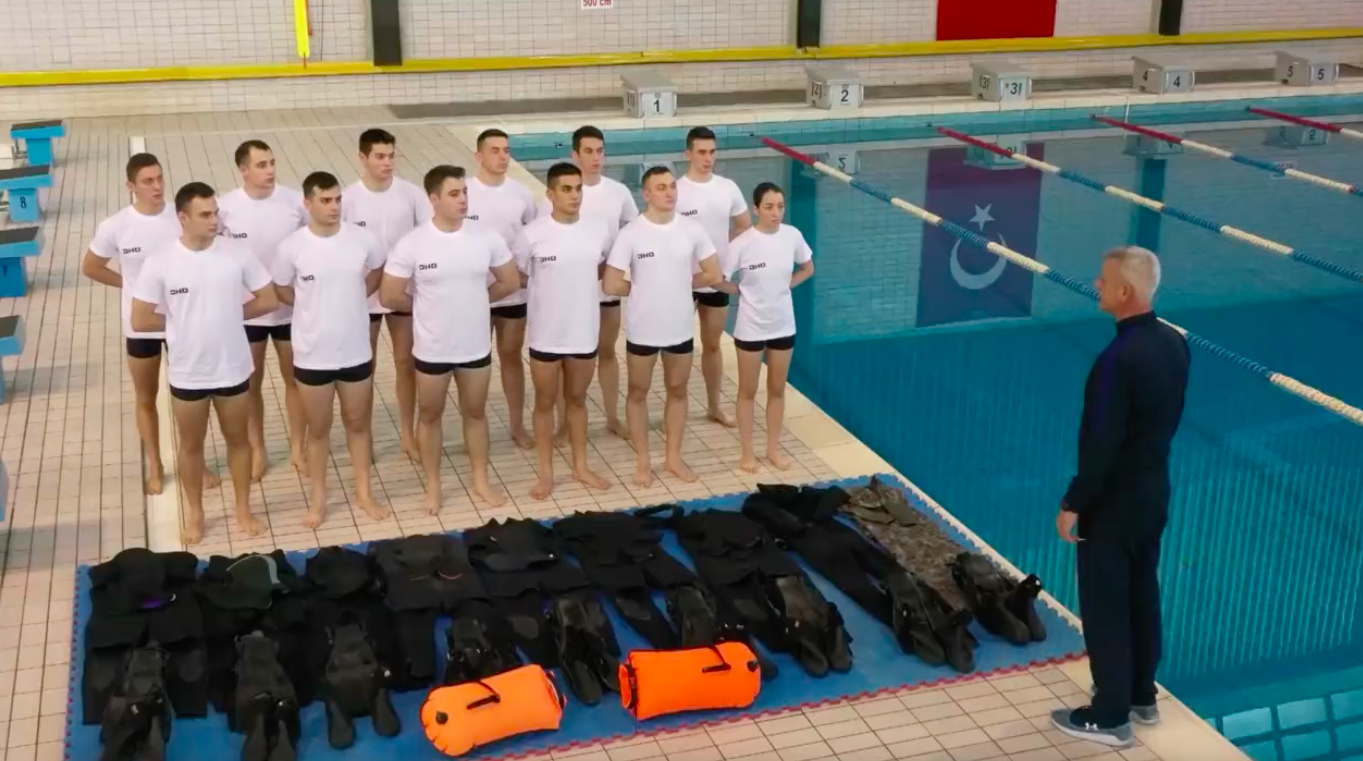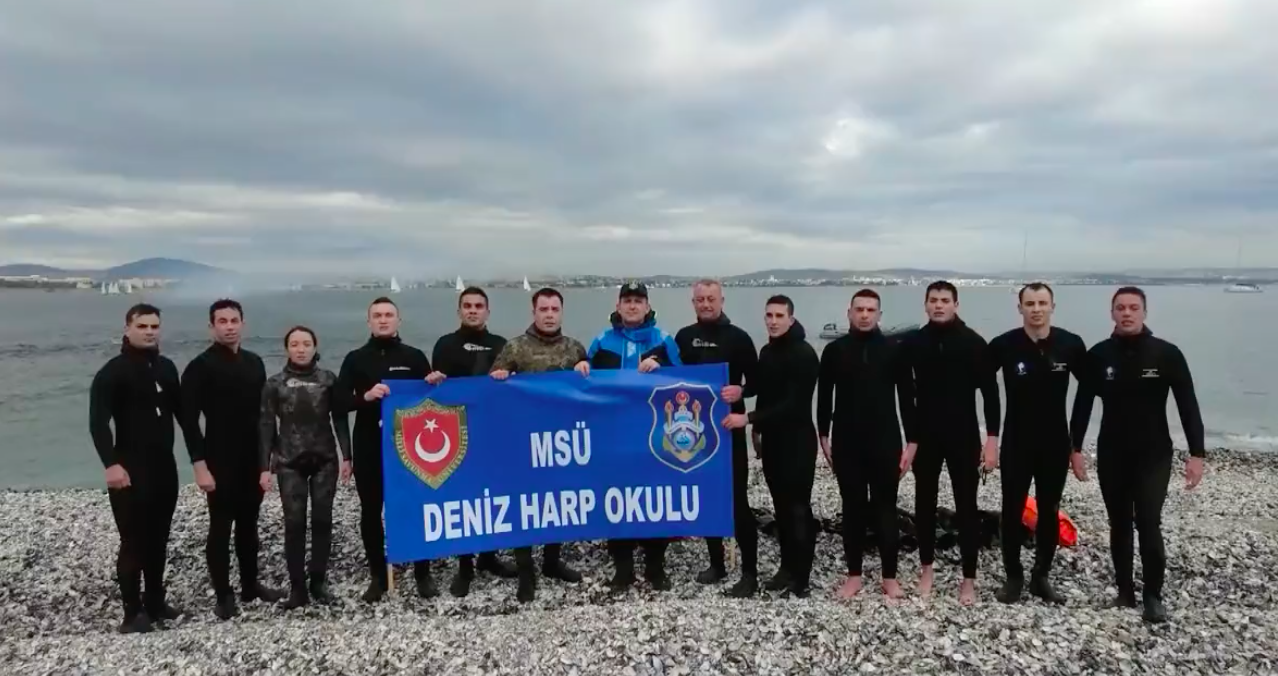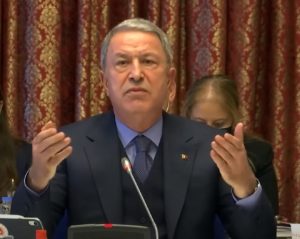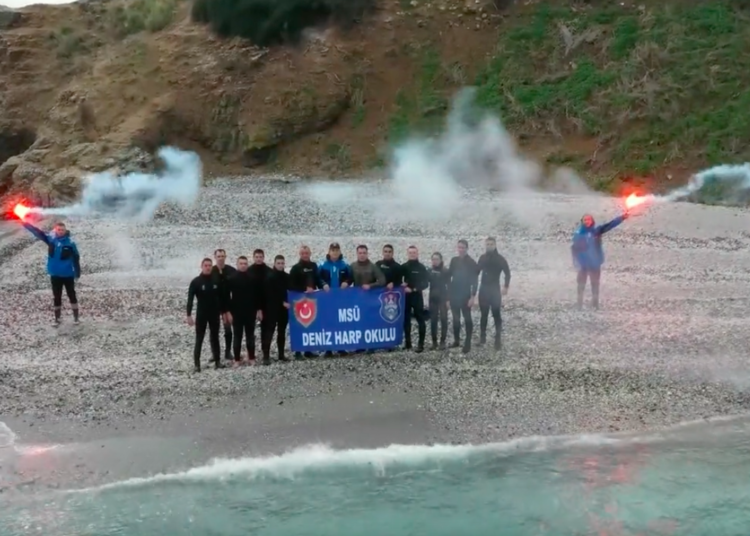Levent Kenez/Stockholm
Turkish naval academy students are seen swimming the distance between Turkey and the Greek island of Kastellorizo (Meis in Turkish) in a video published on the official Twitter account of Turkey’s Defense Ministry. Defense Minister Hulusi Akar had recently stated that the cadets would swim to Kastellorizio, explaining it as being very close to Turkey in discussions about the island.
The video starts with Akar stating that the cadets will swim to the island, then continues with the presentation of a commander at a swimming pool saying, “We will perform the open sea phase of our swimming training today.” It resembles a fictional production with different shooting angles and post-editing. Drone footage has also been used to make it more effective.

Twelve students were chosen to swim to the island, with a female deliberately included in the group. The fact that relatively few swam while there were many more students at the Naval Academy indicates that there was elimination in terms of performance.
The swimmers are accompanied by other students in boats holding torches. The video ends in the Tuzla islets, almost the exact same distance as it is from Turkey to Kastellorizio, 1,950 meters. When the students come ashore, they raise the banner of the Naval Academy, shouting, “My homeland, I would sacrifice my life for you,” a slogan that is often repeated in military training at all levels in the Turkish army.
Turkey and Greece experience tensions from time to time due to the years-long, unresolved continental shelf issue and unilateral natural gas exploration in the Mediterranean on the part of both countries. The European Union urged Turkey to drop plans to drill for oil and gas around Cyprus in the eastern Mediterranean last October. Ankara’s reaction to the EU was harsh. Ironically, Turkey has very close relations with Qatar, which has signed a natural gas exploration agreement with the Republic of Cyprus in the waters it claims. On the way back from a visit to Qatar in December, Turkish President Recep Tayyip Erdoğan merely said he was “sad” when journalists asked about Qatar’s cooperation with Cyprus.
The Defense Ministry has long been sharing nationalist and propaganda posts on social media, behaving more like an army of trolls than an official institution. A large number of social media messages have been published that provoked Greece, especially regarding a controversial doctrine called Blue Homeland, which is based on Turkey’s interests in the Mediterranean. There are also frequent posts about Turkey’s unilateral military operations in Syria and the fight against the outlawed Kurdistan Workers’ Party (PKK). Unconfirmed information is frequently shared, especially about PKK and ISIS (Islamic State in Iraq and Syria) militants who were captured or killed. Images of Akar leading senior commanders on domestic trips are also frequently distributed.
The Defense Ministry, which was a rather boring institution in past years, turned into an effective government body after the government put the General Staff under the supervision of the ministry on July 15, 2018. Undoubtedly, former Chief of General Staff Akar’s appointment as defense minister has been influential in the change. For many, Akar is still the de facto chief of general staff, so much so that unlike previous defense ministers, Akar even had a special uniform prepared for himself. Akar, who managed to establish a command echelon that consists of commanders loyal to him, stands out as the sole arbiter in the military.
Akar, one of the most influential figures in Erdoğan’s cabinet, is often mentioned in post-Erdoğan scenarios. Since one of the easiest ways of attracting attention and public support in Turkey is using nationalist and religious arguments, the Defense Ministry produces videos and propaganda to polish Akar’s image.

Akar played a major role in the purges in the Turkish military after a controversial coup attempt in 2016 and gave the green light for the dismissal of tens of thousands of Erdoğan opponents and pro-NATO officers from the army in order to appear loyal to Erdoğan. Nordic Monitor previously showed that officers promoted to the rank of general in NATO’s second-largest army are relatively less educated and less qualified than their colleagues in previous years, particularly before 2016.
Turkey shut down military academies and all military schools due to alleged involvement in the coup attempt only 10 days after the incident. With a government decree on July 25, 2016, the National Defense University was founded as a replacement for the academies.

Two hundred fifty-nine military cadets were detained on coup charges on July 16, 2016 and were arrested four days later. The cadets were indicted a year after they were put in pretrial detention, and their trial was concluded in May 2018. One hundred eighty-seven of the cadets were sentenced to life in prison on charges of attempting to overturn the constitutional order and overthrow the Turkish government and parliament by use of force as well as membership in a terrorist organization.
The military cadets claimed they had no idea a coup attempt unfolding as their superiors had told them there was a terrorist attack on the Bosporus Bridge.
Akar has been harshly criticized for the fact that the cadets, who had no choice but to follow orders, were sentenced to life over the coup attempt. Critics are quick to remind that Akar himself served as a first lieutenant in the 1980 military coup.












